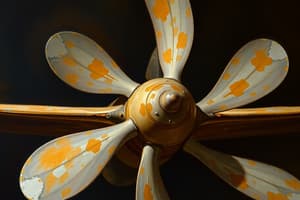Podcast
Questions and Answers
What is the purpose of the slip-ring and brush assembly on the spinner bulkhead?
What is the purpose of the slip-ring and brush assembly on the spinner bulkhead?
- To measure the temperature of the propeller blades
- To reduce the weight of the propeller
- To provide a tight seal for the propeller de-icer
- To transmit current to the boot for de-icing (correct)
Which of the following is a characteristic of a chemical propeller deicing system?
Which of the following is a characteristic of a chemical propeller deicing system?
- It is used on most commercial airliners
- It is commonly used on single-engine GA aircraft (correct)
- It is a pneumatic system
- It is only used for wing deicing
Why should aircraft be de-iced as close to takeoff time as possible?
Why should aircraft be de-iced as close to takeoff time as possible?
- To reduce the holdover time (correct)
- To reduce the risk of engine failure
- To improve the aircraft's aerodynamics
- To reduce the weight of the aircraft
What is the recommended method for removing wet snow deposits from an aircraft?
What is the recommended method for removing wet snow deposits from an aircraft?
What is the purpose of the timer in an electric propeller de-icing system?
What is the purpose of the timer in an electric propeller de-icing system?
What is the recommended method for removing ice from the inside of a turbine engine?
What is the recommended method for removing ice from the inside of a turbine engine?
What is the purpose of removing paint from the area to be covered by the de-icer boots during installation?
What is the purpose of removing paint from the area to be covered by the de-icer boots during installation?
What is the primary disadvantage of using rivet nuts and screws to attach de-icer boots?
What is the primary disadvantage of using rivet nuts and screws to attach de-icer boots?
What should be done to de-icer boots before installing them on a wing?
What should be done to de-icer boots before installing them on a wing?
What is the effect of ice formation on the propeller leading edges, cuffs, and spinner?
What is the effect of ice formation on the propeller leading edges, cuffs, and spinner?
What type of system uses electrical heating elements to deice propellers?
What type of system uses electrical heating elements to deice propellers?
What should be checked during an operational check of a pneumatic de-icer system?
What should be checked during an operational check of a pneumatic de-icer system?
What is the primary purpose of an oil separator in a pneumatic de-icer system?
What is the primary purpose of an oil separator in a pneumatic de-icer system?
What type of pump is used to create a vacuum for operating the flight instruments in a pneumatic de-icer system?
What type of pump is used to create a vacuum for operating the flight instruments in a pneumatic de-icer system?
What is the function of the pressure control valve in a pneumatic de-icer system?
What is the function of the pressure control valve in a pneumatic de-icer system?
What is the purpose of a timer module in a pneumatic de-icer system?
What is the purpose of a timer module in a pneumatic de-icer system?
What type of air pump is used in newer installations of pneumatic de-icer systems?
What type of air pump is used in newer installations of pneumatic de-icer systems?
What is the purpose of the de-icer boots in a pneumatic de-icer system?
What is the purpose of the de-icer boots in a pneumatic de-icer system?
Flashcards are hidden until you start studying
Study Notes
Propeller De-Icer Systems
- The boot is permanently attached and gets current from a slip ring and brush assembly.
- Electrically heated de-icers are bonded to propeller blades for effective ice removal.
- Components of the electric de-icer system include slip-ring and brush assemblies, timers, ammeters, and circuit breakers.
Chemical De-Icing Systems
- Some single-engine general aviation aircraft utilize chemical de-icing systems.
- Ice forms on propellers before wings, necessitating prompt treatment on propeller systems.
- The chemical system may work in conjunction with wing de-icing systems, like the TKS™ weeping system.
Ground De-Icing Procedures
- Frost removal involves spraying a de-icing fluid with ethylene glycol and isopropyl alcohol.
- Wet snow should be removed using brushes or squeegees; avoid sharp tools.
- Holdover time is the duration a de-iced surface remains free from ice, snow, or frost.
- De-icing should occur close to takeoff to minimize holdover time.
Turbine Engine Ice Removal
- Hot air should flow through the engine to melt ice from turbine engines, ensuring all parts move freely.
Inspection and Maintenance of De-Icer Boots
- During pneumatic de-icer system checks, observe suction and pressure gauges for proper reading patterns.
- The pressure gauge fluctuates as de-icer tubes inflate/deflate; the vacuum gauge remains steady.
- Two primary methods for securing rubber de-icer boots are adhesives and rivnuts/screws.
- Bonded de-icer boots offer a smoother airfoil compared to those attached with rivet nuts/screws.
Installation Guidelines
- All paint must be removed from areas where surface-bonded de-icer boots are applied to ensure proper bonding.
- De-icer boots should be kept free of contaminants like oil or dirt and cleaned with mild soap and water.
Efficiency Reduction Due to Ice Formation
- Ice on propeller leading edges, cuffs, and spinners decreases the powerplant efficiency.
- Two main types of de-icing systems: electrical and chemical.
Electrothermal Propeller Device System
- Electrically heated boots on propeller blades are widely used for de-icing.
- An oil separator removes oil from the air before it's used, preventing damage to boots.
- Newer "dry-type" air pumps are increasingly used for these systems, negating the need for oil separators.
Pneumatic De-Icing System Components
- Air Pump: A vacuum pump creates a vacuum for flight instruments and provides air pressure to inflate de-icer boots.
- Vacuum Regulator: Controls the vacuum level applied to de-icer boots and flight instruments.
- Pressure Control Valve: Manages the pressure within the de-icing system.
- Timer Module: Activates a timer for the de-icer boots’ cycle and shuts off after completing a cycle, applying a vacuum until the next activation.
- Other components may include filters, valves, and various tubing for overall system functionality.
Studying That Suits You
Use AI to generate personalized quizzes and flashcards to suit your learning preferences.




